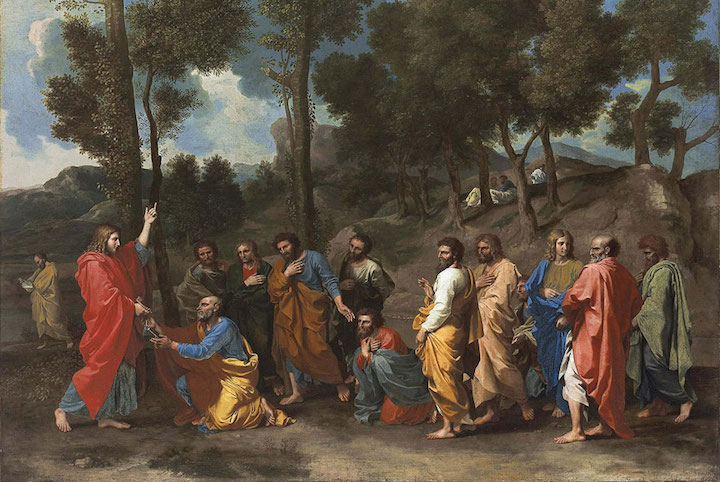In responding to the real scandals in the Church, we must strive to avoid contributing to new ones by how we speak and act. (CCC 2284-87) We ourselves can become occasions of sin to non-Catholics and Catholics, including those not well formed in the faith, who may – in part because of our misguided witness – stop practicing their faith or seek to serve God outside the visible boundaries of the Church. Righteous anger is legitimate, as St. Paul says, but we must avoid sin in expressing that anger, lest the devil magnify the scope and impact of sin, as he is wont to do. (Eph. 4:26-27)
Clergy, especially bishops who egregiously betray their sacred duties as spiritual fathers and shepherds, need to be removed from office and, in some cases, even face criminal charges. And yet we must remember that in establishing his Church, Jesus Christ structured it to have bishops (successors to the apostles) and their priestly collaborators as chief leaders in guiding the New Covenant people of God. (Mt. 16:18-19; 18:15-18) Indeed, throughout salvation history, God has worked through the imperfect human leaders he chose to lead his people, such as Abraham, Moses, and King David.
To be clear, this is certainly not an excuse to tolerate bad clerical leadership in the Church, or argue that lay leaders shouldn’t have important roles in monitoring and reforming that leadership. They should. At the same time, we must be wary of yielding to temptation – or putting temptation in front of others by our words and deeds – by appearing to call into question the God-given authority and mission of the hierarchy, and thereby set ourselves against Christ and his salvific mission (to one extent or another) in our precipitous attempts to foster reform in the Church.
Consider the case of Miriam who, when her brother Moses chose to marry an African woman (a Cushite), decided to call into question his God-given authority because, in her mind, Moses had brazenly married outside the Israelite clan. (Num. 12) She and her brother Aaron contemptuously asked, “Has the Lord indeed spoken only through Moses? . . . Has he not spoken through us also?” Miriam repented after being punished with leprosy for her unrighteous rebellion.
Or consider the worse fate – death – of Korah, Dathan, Abiram and their devoted friends and family, when these leaders similarly attempted to usurp Moses’ God-given authority. (Numbers 16) St. Jude likewise warns against such rebellions in the New Covenant Church era. (Jude 8-11)
In short, while current scandals scream for reform, they do not – and cannot – nullify the Church’s mission that Christ himself safeguards (Mt. 16:19), the counterarguments of the Church’s opponents notwithstanding. If the Church were a merely human institution, we would’ve entered the dustbin of history centuries ago, precisely because of internal scandals and also external persecutions.

Lest anyone think I am oblivious to the great harm that has been done – or can be done – because of clerical sex abuse, I have a longtime friend who was abused as an altar boy by one of our parish priests in the Archdiocese of Detroit. I only found out years later, and I helped him in getting the offending priest permanently removed from ministry in 2002.
This friend says he has not prayed for a long while, let alone practiced the Catholic faith of his childhood. I simply strive to continue being his friend and plant seeds where I can, hoping and praying that he can one day clearly distinguish Christ and his Church from those who commit heinous crimes.
As is typical in Catholicism, we’re facing a both/and situation. Those who have been injured by the Church’s ministers and other leaders need justice done, and vigilant accompaniment in their suffering. As I’ve often conveyed to fallen-away Catholics and non-Catholics, don’t let anyone keep you from the healing balm and peace-inducing love of Jesus Christ in his Church (John 14:27), particularly in the Eucharist and the Sacrament of Reconciliation. Don’t let those who gravely betray the Church’s mission deter you from seeing and embracing the Church as the God-given reality she is at her core.
In addition, to foster justice and healing, criticism of our spiritual leaders must be constructive, i.e., always expressed out of genuine love for Christ and the faithful, including wayward bishops and priests who not only need to be punished for their grave misconduct, but also brought to repentance and reconciliation with the Lord and his Church.
Various individuals and groups have called for an independent investigation of the McCarrick case and other such cases. Under Church law, though, only the pope has the authority to discipline bishops. (Canons 1405-06) Pope Francis should empower a board featuring faithful lay experts to publicly recommend punishments for offenders, including dismissal from the clerical state (Canon 1336), as well as measures for rooting out the subculture that aided and abetted these scandals. This board can draw on – but not be limited to – the USCCB’s investigative work, which Cardinal Daniel DiNardo, president of the bishops’ conference, recently announced.
As the Church’s supreme pastor, Francis needs to intervene in the United States and elsewhere. These investigations, though painful, are indispensable to restoring order in the Church and confidence in the Church’s leadership. Not doing so risks new and even worse scandals, including secular interventions– and further action by misguided souls who foster contempt for Christ and the Church He established.
*Image: The Sacrament of Ordination (Christ Presenting the Keys to Saint Peter) by Nicholas Poussin, c. 1640 [Kimball Art Museum, Fort Worth, TX]















